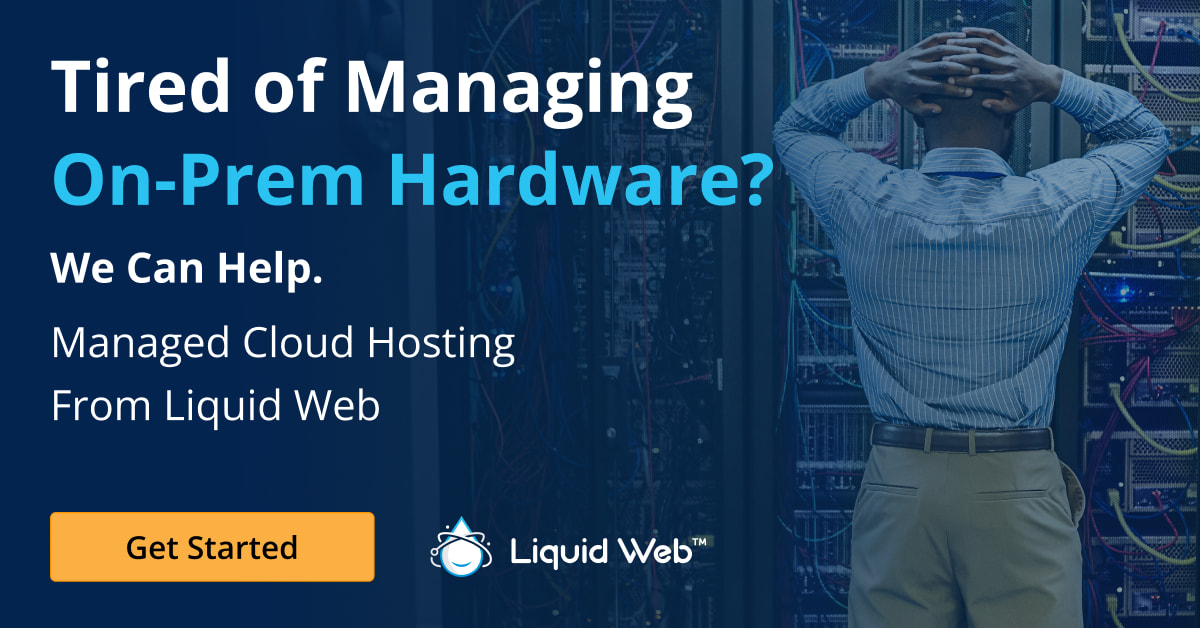Considerations When Moving From On-Premises To Managed Private Cloud
Not so long ago, comparing on-premises to managed private cloud server solutions was impossible – third-party cloud storage solutions didn’t exist. That means many businesses operating today developed their basic processes, data architecture, and service delivery solutions in a world where on-premises servers were the only option. Those solutions mostly still work well enough – but now those organizations are beginning to look at alternatives.
Use this guide to learn what a managed private cloud is, what moving to a managed private cloud can do for you, and what you need to know when planning such a move.
What Is a Managed Private Cloud? Benefits Over an On-Premises Deployment Model
A managed private cloud is a clustered server environment managed and maintained by a third party, almost always off-site, and reserved for your exclusive use. On-premises server solutions are almost always private for practical reasons unless you are a cloud service provider yourself. However, there is no reason a private server needs to be on-premises.
The managed private cloud model offers several advantages over other cloud and on-premises server solutions, including the fact that you don’t have to purchase, maintain, or upgrade the server or any other infrastructure itself. This means you can achieve deployment and scaling very rapidly as well. You don’t have to have an in-house sysadmin, either.
At the same time, you don’t lose out on the benefits of an on-premises private server – you still get the easy, dedicated integration, the perpetual software licensing, and the self-scheduled upgrade/downtime cycles you depend on.
Why Moving From On-Premises To A Managed Private Cloud Is Right for Your Business
The on-premises vs cloud debate will go on for a long time because there are still a few very good reasons some organizations will want to maintain their own on-site servers. If your business is large enough that you can make efficient use of a multi-server data center yourself, you probably would not save significantly by switching to a third-party managed cloud service.
However, most businesses are not so large, or at least do not make such heavy use of their servers as to make on-premises solutions truly cost-effective. If you fall into that group, here are some reasons you could save money, improve service delivery, and ease internal administrative burdens by shifting to a managed private cloud data architecture.
Key Factors To Consider When Moving to a Managed Private Cloud Infrastructure Platform Provider
There are plenty of great reasons to switch from on-premises to managed private cloud solutions. Here are the six managed private cloud benefits that are shown to be the most important to a majority of organizations. This list is not exhaustive, however.
1. Increased Efficiency
Availability, uptime, access speeds, and latency are all factors that can affect the actual efficiency of a server. In a managed private cloud situation, each can be made part of the service level agreement (SLA), guaranteeing minimum levels of the factors that you need most. As a result, your servers will be more efficient than ever.
2. Improved Scalability
Of course, one of the best parts of a managed private cloud is that it is managed. If you need more capacity, experts are on hand to migrate your data to a beefier server or to split the load across two or more (still private) servers. Your monthly fees will increase a little, but you won’t have to find, purchase, or install any of that infrastructure yourself.

3. Reduced Costs
There are many reasons why an off-site cloud provider can offer private cloud solutions that cost less than your on-premises solutions and still make a healthy profit. Mostly, it comes down to the economy of scale, but there is a little more to it than that.
4. Enhanced Security
Similarly, a professional cloud service provider with a dozen, a hundred, or a thousand clients can put more time, effort, and money into security than would ever be cost-effective for small and medium-sized enterprises (SMEs). Your data will almost always be better protected with a managed cloud provider than on an on-premises server.
5. Greater Control Over Data and Infrastructure
The real strength of a managed private cloud server is that it is both managed and private. Because it is private, your data architecture is your own. You decide, and you need to make no concessions to other tenants on the server. There are none. Because it is managed, you just have to tell the server manager what is to be done.
6. Faster Time to Market
This is synergistic… You enjoy superior scalability, efficiency, and security. In addition, because you have an expert server management team to tap into at a moment’s notice, you can change the server side of your operation nearly instantly. These days, the internet IS your route to market.
How Does Migrating to a Managed Private Cloud Impact Users?
Moving from on-premises to managed private cloud solutions affects your applications, data, and overall IT security immensely. However, all of these are affected positively. For most users, there is no downside at all.
What Challenges Does an Organization Face When Moving From an On-Premises Model to a Managed Private Cloud?
That isn’t to say there are zero teething issues when making the switch. Any server migration can be a stressful time. However, if you choose the right provider, it can often be achieved without any impact on your productivity at all.
Final Thoughts on Moving to Managed Private Cloud
The issue of on-premises vs cloud server solutions is a big decision for every company. If managed properly, however, making the switch is almost always a positive change.
Talk to us today and find out if this is the right time for you to make the switch.

Kelly Goolsby
Kelly has worked in the hosting industry for nearly 16 years and loves seeing clients use new technologies to build businesses and solve problems. His roles in technology have included all facets of Sales and, more recently, Solution Architecture, Technical Sales, and Sales Training. Kelly really loves having a hand in developing new products and helping clients learn how to use them.
Keep up to date with the latest Hosting news.




